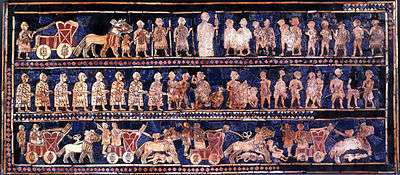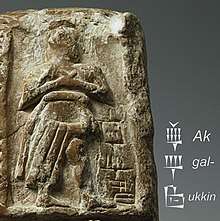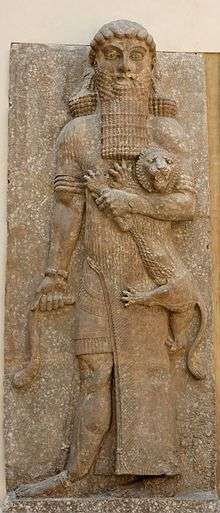Aga of Kish
Agga (𒀝𒂵) was a king of Kish (c. 2600 – c. 2580) and the son of Enmebaragesi. He besieged Uruk for irrigation but was defeated by Gilgamesh.[2]
| Aga 𒀝𒂵 | |
|---|---|
| |
.jpg) The name "Akka" appears in the Stele of Ushumgal, as the Great Assembly official.[1] | |
| Reign | c. 2600 – c. 2580 BCE |
| Predecessor | Enmebaragesi (father) |
| Successor | Gilgamesh (Uruk Dynasty) |
| Dynasty | First dynasty of Kish |
According to the Stele of Ushumgal, he was the official of the Great Assemble of Umma, which he probably ruled over with Zabala according to sources, and the fact that it was dependant of Umma on the Early Dynastic Period. He is listed as the last king of the 1st Dynasty of Kish. According to the sumerian poem “The envoys of Agga”, he demanded Gilgamesh to work for the irrigation of Kish; however, the king of Uruk refused which resulted in the siege of the city. Gilgamesh tricks Agga and captures him, but at the end of the poem, he lets him free.
Name
The name of Akka is Sumerian although Kish was ruled by Semitic kings. Akka is a relatively rarely attested personal name in Early Dynastic times, making his identification in royal texts spottable.
| 𒀝𒂵 | 𒀝𒃷 | 𒀝 |
|---|---|---|
| Ag-ga | Ag-ga3 | Ag |
| Ak-ka | Ak-ka3 | Ak |
Historical king
Agga is attested as the son Enmebaragesi, who has been verified through archaeological inscription, in the Sumerian King List, the Gilgamesh poem and the Tummal Inscription. This sources may confirm Agga and Gilgamesh existence.

"Enmebaragesi,
The king in this very city (that is Nippur),
built the House of Enlil,
Agga the son of Enmebaragesi,
made the Tummal pre-eminent.
Then the Tummal fell into ruins for the first time.
Meš-Ane-pada built the Bur-šušua in Enlil's temple.
Meš-ki-aĝ-nuna, son of Meš-Ane-pada,
made the Tummal flourish and brought Ninlil into the Tummal."
Siege of Uruk
| Siege of Uruk | |||||||
|---|---|---|---|---|---|---|---|
 | |||||||
| |||||||
| Belligerents | |||||||
| Kish | Uruk | ||||||
| Commanders and leaders | |||||||
| Aga |
Gilgamesh Enkidu Birhurtura | ||||||
| Strength | |||||||
| Unknown | Unknown | ||||||
| Casualties and losses | |||||||
| Unknown | Unknown but lower. | ||||||
Envoyers of Agga
Agga sent a threat to Uruk demanding the city to work as slaves for the irrigation of Kish, by building canals and digging wells.
Irrigation was pivotal for the sumerian life, which, along drainage, created canals for transportation. The original text does not give much detail, but according to Dina Katz, this interpretation is supported by Stele of the Vultures, which describes the aftermath of a war. King Eannatum details the oath taken by the defeated king of Umma:[6]
I shall not shift it's irrigation canals and channels.
Declaration of War
Gilgamesh recounts the threat to the city elders and proposes to rebel against Agga, but they refuse as the city is powerful and has the hegemony of Sumer. Gilgamesh doesn't listen to them and makes the same propotion to the soldiers of the city, which they accept by answering a proverb, paralleling Agga's demand. The soldiers make Gilgamesh the officer during wartime. [7]
| Agga's threat | Soldiers' response |
|---|---|
|
There are wells to be finished, |
Standing on duty, |
Siege and war
Around 4 days later, Agga and his army sieged Uruk and the gates of the city, making unable fighting in the open. However Gilgamesh devises a plan, who voluntarily starts his royal guard Birhurtura. After leaving the city gates, he is captured, tortured, taken to the middle of the army where Agga is and interrogated by him. Displaced from the entrance of the city, Gilgamesh looks out over the wall, distracting the soldiers. Taking advantage of the diversion, Enkidu, leading the Uruk soldiers, leaves through the city gates and attack in the open field. In the middle of the battle, Gilgamesh defeats Agga. [8]
Consequences

Agga asks for mercy to Gilgamesh, who remembers his past life serving as a soldier to the King of Kish. Gilgamesh takes pity and lets Agga go back to his city, with Kish's hegemony destroyed and Uruk's liberation. [9]
Symbolism
This is the only one of the five sumerian poems of Gilgamesh who has no mythological aspects. It is also remarkable to note that in this story the battlefield, Enkidu and Birhurtura are given a leading role, wile Gilgamesh stayed on the wall, distracting Agga with his corpulence. The text is made in the form of parallels, such as the threat and its response, both based on Sumerian proverbs, the fact that Gilgamesh asks the elders and then asks the soldiers the same question and that a soldier leans out of the wall and Gilgamesh then makes the same action. Gilgamesh and Birhurtura speak of "confusing Agga" although later in the poem it is Uruk who is "confused". However in the end only the king keeps his promise, emphasizing Gilgamesh's ironic portrayal.
See also
Notes
His name appears in the Stele of Ushumgal, as a gal-ukkin ("Great Assembly") official (𒀝𒃲𒌺, Ak gal-ukkin).[1][10] It has been suggested this could refer to Aga himself.[1] The term 𒃲𒌺𒈾, gal-ukkin-na, generally means "Chairman of the Assembly".[11]
References
- Frayne, Douglas. The Struggle for Hegemony in "Early Dynastic II" Sumer. pp. 65–66.
- http://etcsl.orinst.ox.ac.uk/section1/tr1811.htm
- "Sumerian Dictionary "Aga" (RN) entry". Upenn.edu.
- Kramer, S.N. (1963). The Sumerians: their history, culture, and character. University of Chicago Press. p. 46. Retrieved 2011-12-29.
- "CDLI-Found Texts". cdli.ucla.edu.
- Gilgamesh and Akka by Dina Kat|page 17|
- Gilgamesh and Akka by Dina Kat|page 5|
- http://etcsl.orinst.ox.ac.uk/section1/tr1811.htm
- Sumerian King List
- "CDLI-Found Texts". cdli.ucla.edu.
- Fleming, Daniel E. (2000). Time at Emar: The Cultic Calendar and the Rituals from the Diviner's Archive. Eisenbrauns. p. 209, note 34. ISBN 978-1-57506-044-6.
External links
| Regnal titles | ||
|---|---|---|
| Preceded by En-me-barage-si |
King of Sumer c. 2600 BCE or legendary |
Succeeded by Gilgamesh of Uruk |
| Ensi of Kish c. 2600 BCE or legendary |
Succeeded by Unknown | |
